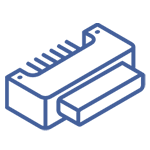

Hirose HIF3BB-64D-2.54R-CL(63
Manufacturer No:
HIF3BB-64D-2.54R-CL(63
Tiny WHSLManufacturer:
Utmel No:
1092-HIF3BB-64D-2.54R-CL(63
Package:
-
Description:
Headers & Wire Housings
Quantity:
Unit Price: $7.895462
Ext Price: $7.90
Delivery:





Payment:











In Stock : 34
Minimum: 1 Multiples: 1
Qty
Unit Price
Ext Price
1
$7.895462
$7.90
10
$7.448549
$74.49
100
$7.026933
$702.69
500
$6.629182
$3,314.59
1000
$6.253945
$6,253.94
Want a lower wholesale price? Please send RFQ, we will respond immediately.
RFQ Now
Add to RFQ list
You may place an order without registering to Utmel.
We strongly suggest you sign in before purchasing as you can track your order in real time.
For your convenience, we accept multiple payment methods in USD, including PayPal, Credit Card, and wire transfer.
RFQ (Request for Quotations)It is recommended to request for quotations to get the latest prices and inventories about the part.
Our sales will reply to your request by email within 24 hours.
1. You'll receive an order information email in your inbox. (Please remember to check the spam folder if you didn't hear from us).
2. Since inventories and prices may fluctuate to some extent, the sales manager is going to reconfirm the order and let you know if there are any updates.
- TypeParameter
- Mounting Type
The "Mounting Type" in electronic components refers to the method used to attach or connect a component to a circuit board or other substrate, such as through-hole, surface-mount, or panel mount.
Free Hanging (In-Line) - Contact Plating
Contact plating (finish) provides corrosion protection for base metals and optimizes the mechanical and electrical properties of the contact interfaces.
Gold - Factory Pack QuantityFactory Pack Quantity1
- Part # Aliases610-0203-4-63
- ManufacturerHirose Electric
- BrandHirose Connector
- RoHSDetails
- PackageBulk
- Base Product Number
"Base Product Number" (BPN) refers to the fundamental identifier assigned to a component by the manufacturer. This number is used to identify a specific product family or series of components that share common features, characteristics, or functionality. The BPN is usually part of a larger part number or order code that includes additional information, such as variations in packaging, tolerance, voltage ratings, and other specifications.
HIF3 - MfrHirose Electric Co Ltd
- Product StatusActive
- Maximum Operating Temperature
the maximum body temperature at which the thermistor is designed to operate for extended periods of time with acceptable stability of its electrical characteristics.
+ 85 C - Housing GenderSocket
- Minimum Operating Temperature- 55 C
- Mounting StylesCable Mount / Free Hanging
- Contact MaterialsBeryllium Copper
- Packaging
Semiconductor package is a carrier / shell used to contain and cover one or more semiconductor components or integrated circuits. The material of the shell can be metal, plastic, glass or ceramic.
Tray - Series
In electronic components, the "Series" refers to a group of products that share similar characteristics, designs, or functionalities, often produced by the same manufacturer. These components within a series typically have common specifications but may vary in terms of voltage, power, or packaging to meet different application needs. The series name helps identify and differentiate between various product lines within a manufacturer's catalog.
HIF3B - Connector Type
Connector Type in electronic components refers to the specific design and configuration of the connector used to establish electrical connections between different devices or components. This parameter describes the physical shape, size, and layout of the connector, as well as the number and arrangement of pins or contacts. Common connector types include USB, HDMI, RJ45, and D-sub connectors, each serving different purposes and applications. Understanding the connector type is crucial for ensuring compatibility and proper functionality when connecting electronic devices together.
Socket - TypeRibbon Cable
- Number of Positions64
- ColorBlack
- Number of Rows2
- Fastening Type
There are 5 Main Types of Fastening Type: Screws, Nails, Bolts, Anchors, Rivets.
- - SubcategoryHeaders & Wire Housings
- Contact Type
Contact Type in electronic components refers to the specific design and configuration of the electrical contacts used to establish connections between components or devices. The contact type determines how the electrical signals are transmitted between the components, and it can vary based on factors such as the application requirements, signal type, and environmental conditions. Common contact types include pin contacts, socket contacts, surface mount contacts, and wire-to-board contacts. Understanding the contact type is crucial for ensuring proper connectivity and reliable performance in electronic systems.
Female Socket - Pitch
In electronic components, "Pitch" refers to the distance between the center of one pin or lead to the center of the adjacent pin or lead on a component, such as an integrated circuit (IC) or a connector. It is a crucial parameter as it determines the spacing and alignment of the pins or leads on a component, which in turn affects how the component can be mounted on a circuit board or connected to other components.The pitch measurement is typically expressed in millimeters (mm) or inches (in) and plays a significant role in determining the overall size and layout of a circuit board. Components with different pitches may require specific types of circuit boards or connectors to ensure proper alignment and connection. Designers must carefully consider the pitch of components when designing circuit layouts to ensure compatibility and proper functionality of the electronic system.
0.100 (2.54mm) - Contact Finish
Contact finish refers to the surface coating or treatment applied to the electrical contacts of electronic components. This finish is crucial for ensuring reliable electrical connections and preventing corrosion or oxidation of the contacts. Common contact finishes include gold, silver, tin, and nickel, each offering different levels of conductivity, durability, and resistance to environmental factors. The choice of contact finish depends on the specific application requirements, such as operating conditions, cost considerations, and compatibility with other components in the circuit. Selecting the appropriate contact finish is essential for maintaining the performance and longevity of electronic devices.
Gold - Termination Style
"Termination style" in electronic components refers to the method used to connect the component to a circuit board or other electronic devices. It determines how the component's leads or terminals are designed for soldering or mounting onto the circuit board. Common termination styles include through-hole, surface mount, and wire lead terminations.Through-hole components have leads that are inserted through holes in the circuit board and soldered on the other side. Surface mount components have flat terminals that are soldered directly onto the surface of the circuit board. Wire lead terminations involve attaching wires to the component for connection.The choice of termination style depends on factors such as the type of component, the manufacturing process, and the space available on the circuit board. Different termination styles offer various advantages in terms of ease of assembly, reliability, and space efficiency in electronic designs.
IDC - Contact Gender
Contact Gender in electronic components refers to the physical characteristics of the electrical contacts within a connector or terminal block. It indicates whether the contact is male or female, which determines how the connectors can be mated together. Male contacts typically have protruding pins or plugs, while female contacts have receptacles or sockets to receive the male contacts. Matching the correct contact genders is crucial for ensuring proper electrical connections and preventing damage to the components. Manufacturers often specify the contact gender of their components to facilitate compatibility and ease of use in electronic systems.
Socket (Female) - Wire Gauge
a measurement of?wire?diameter.?This determines the amount of electric current the wire can safely carry, as well as its electrical resistance and weight.
28 AWG - Insulation Resistance
The measurement of insulation resistance is carried out by means of a megohmmeter – high resistance range ohmmeter. A general rule-of-thumb is 10 Megohm or more.
1000 MOhm - Row Spacing
the space needed between rows to allow room for people or farm equipment to get through.
0.100 (2.54mm) - Cable Termination
Cable Termination is the connection of the wire or fiber to a device, such as equipment, panels or a wall outlet, which allows for connecting the cable to other cables or devices.
IDC - Product Type
a group of products which fulfill a similar need for a market segment or market as a whole.
Headers & Wire Housings - Wire Type
There are mainly 5 types of wire:Triplex Wires,Main Feeder Wires,Panel Feed Wires,Non-Metallic Sheathed Wires,Single Strand Wires.
Ribbon Cable - Product
In the context of electronic components, the parameter "Product" typically refers to the specific item or device being discussed or analyzed. It can refer to a physical electronic component such as a resistor, capacitor, transistor, or integrated circuit. The product parameter may also encompass more complex electronic devices like sensors, displays, microcontrollers, or communication modules.Understanding the product parameter is crucial in electronics as it helps identify the characteristics, specifications, and functionality of the component or device in question. This information is essential for selecting the right components for a circuit design, troubleshooting issues, or comparing different products for a particular application. Manufacturers often provide detailed product datasheets that outline key specifications, performance characteristics, and application guidelines to assist engineers and designers in utilizing the component effectively.
Connectors - Mounting Angle
The "Mounting Angle" parameter in electronic components refers to the angle at which a component is mounted on a circuit board or within an electronic system. It is important to consider the mounting angle during the design and assembly process to ensure proper functionality and performance of the component. The mounting angle can affect factors such as signal integrity, thermal management, and mechanical stress on the component. Manufacturers often provide specific guidelines or recommendations for the mounting angle of their components to ensure optimal operation and reliability.
Straight - Features
In the context of electronic components, the term "Features" typically refers to the specific characteristics or functionalities that a particular component offers. These features can vary depending on the type of component and its intended use. For example, a microcontroller may have features such as built-in memory, analog-to-digital converters, and communication interfaces like UART or SPI.When evaluating electronic components, understanding their features is crucial in determining whether they meet the requirements of a particular project or application. Engineers and designers often look at features such as operating voltage, speed, power consumption, and communication protocols to ensure compatibility and optimal performance.In summary, the "Features" parameter in electronic components describes the unique attributes and capabilities that differentiate one component from another, helping users make informed decisions when selecting components for their electronic designs.
Feed Through, Polarizing Key, Strain Relief - Product Category
a particular group of related products.
Headers & Wire Housings - Contact Finish Thickness
Contact Finish Thickness refers to the measurement of the layer of conductive material applied to the surfaces of electrical contacts in electronic components. This thickness is critical as it influences the electrical conductivity, solderability, wear resistance, and overall performance of the connection. The materials used for the contact finish can include gold, silver, or other metals, and the specified thickness is designed to ensure reliable operation over the component's lifespan.
7.87µin (0.200µm) - Flammability Rating
The Flammability Rating of electronic components refers to the material's ability to resist catching fire or burning when exposed to heat or flames. It is an important safety consideration in electronic design and manufacturing, especially for components that may be used in environments where fire hazards are a concern. The rating is typically expressed using a standardized scale, such as UL94, which classifies materials based on their flammability characteristics. Components with higher flammability ratings are more resistant to ignition and contribute to overall fire safety in electronic devices. It is crucial to select components with appropriate flammability ratings to ensure the reliability and safety of electronic products.
UL94 V-0
![ST40X-18S-CVR(30)]()
ST40X-18S-CVR(30)
Hirose Electric Co Ltd![DF11-10DS-2R26(05)]()
DF11-10DS-2R26(05)
Hirose Electric Co Ltd![DF51-4DEP-2C]()
DF51-4DEP-2C
Hirose Electric Co Ltd![S-1624A(09)]()
S-1624A(09)
Hirose Electric Co Ltd![S-1660G(09)]()
S-1660G(09)
Hirose Electric Co Ltd![SW-1660A(09)]()
SW-1660A(09)
Hirose Electric Co Ltd![SD-1634A(09)]()
SD-1634A(09)
Hirose Electric Co Ltd![SD-1660G(09)]()
SD-1660G(09)
Hirose Electric Co Ltd![3240-10P-C(50)]()
3240-10P-C(50)
Hirose Electric Co Ltd![3240-12P-TO-C(50)]()
3240-12P-TO-C(50)
Hirose Electric Co Ltd


















